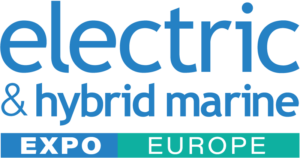Electric and Hybrid Marine Technology International sits down with Dr Makhlouf Benatmane, marine navy solutions leader for GE Power Conversion, to find out more about his presentation “Enabling lifecycle performance through the ship’s electric grid” planned for Electric and Hybrid Marine Expo Europe in Amsterdam, Netherlands.
Benatmane has over 30 years of experience in electrical systems engineering, in industrial and marine applications. He has been a university lecturer in power system design, electrical power station design and power electronics. Having held many roles with GE Power Conversion and its predecessors, Benatmane has led many projects from research and development to execution of both naval and commercial ship systems. He was director and market segment leader of the marine naval and renewables segments worldwide. He has also had international placements and worked with many shipyards around the world.
He holds a PhD in electrical engineering from the University of Nottingham and a BSc (Hons). Alongside this, Benatmane is a chartered engineer, fellow of the Institute of Engineering and Technology and a fellow of the Institute of Marine Engineering, Science & Technology. He is currently the marine navy solution leader for GE Power Conversion.
His presentation will look at enabling lifecycle performance through the ship’s electric grid and will show how electrification enables the efficiency and connectivity of systems in vessel networks, the electric network trends in hosting more sustainable solutions and enhanced automation over life and the impact on the vessel lifecycle from availability to decarbonization. It will also examine the concept of an electric drivetrain technology, combining an electrical rotating machine and associated power electronics.
How well is the electrification and hybridization of vessels progressing?
The industrial revolution was driven by one of the greatest inventions of the 20th century: the combustion engine. For the majority of applications, it has been the power and propulsion behind almost the entire marine ecosystem. However, technological advances, coupled with a more challenging economic environment and the need to reduce carbon emissions, are now changing the way we can operate as an industry. While there is still a place for combustion engines, the marine ecosystem is more widely embracing electrification solutions, in a bid to become cleaner, smarter and more efficient.
Ships propulsion systems electrification is now the standard solution, and coupled with hybridization (i.e. adding energy storage) to vessels is becoming even more attractive as this contributes to lower operating costs and decarbonization.
Decarbonization – the reduction of greenhouse gas emissions into the atmosphere – is a high-profile global issue with every sector impacted by the process. The push toward achieving net-zero emissions to combat climate change has intensified the focus on decarbonizing industries across the spectrum, and the maritime sector, in particular, is no exception.
The switch from fossil fuels to carbon-free and renewable energy sources is also finding its way on all types of vessels. Ship operators and equipment manufacturers are all becoming more aware of greenhouse gas emissions and the resulting global temperature increase are a key cause of climate change. Cleaner ships are becoming more attractive and present a huge advantage to commercialization.
The progress toward electrification and hybridization of vessels has been proceeding well but more can be done in scalability and cost-effectiveness to meet shipping’s decarbonization targets underscored by the International Maritime Organization (IMO) revised GHG strategy and having alternative cleaner energy sources to meet ships’ operating profiles.
What are the current trends, and do they present difficulties or opportunities?
Total decarbonization, or working towards it, is the duty of all, including ship energy systems, and is the only solution to climate stabilization. Indeed, the reduction of carbon dioxide emissions, as well as greenhouse gases in general, by the maritime sector is a common goal at the international, European and national levels.
This comes with both difficulties and opportunities and this change in ship technologies will have an impact on: new ship builds (transformation or technology change of one or more main engines), which will benefit from the new technologies and alternative fuels that will gradually be made available; existing ships, which, unable to use fuels with significantly different characteristics from current fuels, will need to reduce the quantity of emissions from fossil fuels by adopting suitable operational procedures, accepting an impact on service, consumption reduction techniques, or even modifying their prime movers completely to cleaner biofuels; it will see the addition of some sort of batteries systems and/or energy storage, which will come at cost and use of valuable ship spaces; and port infrastructures.
Each ship differs in type, installed power, type of navigation. The optimal solution for its decarbonization should be carefully considered based on the regulations and relevant standards. It is evident that a single solution cannot be decisive for all ships and for their entire lifecycle, considering that emissions limits will become increasingly stringent over time.
The decarbonization process of the maritime industry presents opportunities in investments in technologies, incentives to invest in new ships/technologies, and opportunities to reduce the price differential between existing fuels and future alternative fuels. And more importantly, the opportunity for a cleaner planet and to minimize climate change.
What are the key points in your presentation you’d like attendees to take away?
The first is the need to address the urgent challenges of maritime decarbonization and to turn net-zero obligation into economic opportunity. Additionally, I’d like attendees to take in the possibility of developing options applicable to the existing fleet, such as the use of drop-in solutions, or new ship systems to have cleaner vessel systems. Another key one is what GE is doing and developing to catalyze access to more secure, sustainable, reliable and affordable electricity to help drive economic development. Finally, I’d like to emphasize how GE helps ship owners, operators and designers to decarbonize, and create meaningful, lasting change end-to-end.
To register for your Electric and Hybrid Marine Expo Europe Conference pass, please click here.




